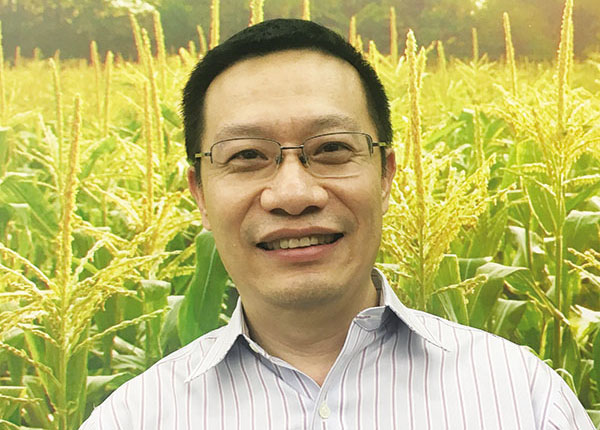Monsanto delivers innovative technology to help corn farmers yield high production
 |
What are the latest trends in the Asian corn industry? How is the Vietnamese market similar to its neighbours – and how is it different?
I can see that demand for corn in Asia, and Vietnam in particular, will soar in the mid- and long-term. The young middle-class consumers, with increased spending power, will prefer corn as they want a better diet and a healthy supply of protein. This will drive up the demand for corn, which is already the second-largest crop in Vietnam after rice.
Vietnam has 1.2 million hectares of corn fields, and annual productivity stands at 5.6 million tonnes. This is well below the world’s average and behind other countries in the region, which means Vietnam still has to import 7.5 million tonnes of corn grains every year for food and feed use despite the vast amount of land dedicated to the crop. This paradox really puts the question of improving productivity in the spotlight.
Another urgent issue that the Vietnamese corn industry faces is the limited supply of land. Vietnam has little additional land for corn to claim, thus the corn industry must enhance its productivity on its existing fields. The best solution to do this, according to research, is to invest in technology.
From my experience, two important technologies for the Vietnamese corn industry are seed genetics and biotechnology. The first one increases the yield, while the second one protects the yield that the new seed produces.
Can you elaborate on the technologies that can improve corn productivity in Vietnam? As an agricultural firm, how does Monsanto help Vietnamese farmers adopt these new technologies for their corn?
First, the key to enhancing yield starts with genetics. A stronger breed of corn, which can be from anywhere from Brazil to the US, is already more resistant to disease before any use of additional chemicals.
Second, biotechnology provides farmers with weed management and insecticide solutions. In the past, weed and insects were the main headaches for farmers – as the corn would often die together with the weed after they sprayed chemicals, and insecticides are harmful for humans to inhale. In addition, the conventional ways of spraying chemicals in Vietnam are time-consuming and labour-intensive. Biotechnology can help solve these problems for farmers.
As a leading agricultural firm, Monsanto is committed to helping Vietnamese farmers become self-sufficient in corn production. We always offer farmers the best quality seed, continue to introduce new advanced hybrids for their choices, and continue to work with them to improve agronomic practices that can optimise their benefits when using our technology.
It’s known that Monsanto launched the Dekalb Genuity hybrid corn seed in Vietnam last year. What is the greatest economic value that farmers and the industry earned from this new variety, and what plans do you have in mind for this corn seed in the next few years?
In Vietnam last November, we launched the Dekalb Genuity hybrid corn seed, which combines high-yielding seed genetics with Genuity-stacked trait technology for higher returns and stronger protection. Specifically, the new seed has easy and effective weed control with the over-the-top application of Maxer 660SC, which saves labour, and the high level of protection against three key insect pests, which are Asian Corn Borer, Common Cutworm and Corn Earworm.
After a year, we’ve received positive responses from 20,000 farmers, and our distributors predict that adoption rates will jump from 30 to 70 per cent in the second year. Farmers noted that the new seed has reduced the amount of pesticides they use on corn and improve environmental safety. Thanks to this positive response, we plan to quadruple our volume in 2017.
The main challenge is that we have a small team in Vietnam, and millions of farmers are spread across the entire country. To reach more Vietnamese farmers, especially those in remote areas, we’ll collaborate with various stakeholders, from the government and academics to opinion leaders and distributors. Training and trial periods are important as these are new technologies.
What the stars mean:
★ Poor ★ ★ Promising ★★★ Good ★★★★ Very good ★★★★★ Exceptional
Latest News
More News
- Masan Consumer names new deputy CEO to drive foods and beverages growth (February 23, 2026 | 20:52)
- Myriad risks ahead, but ones Vietnam can confront (February 20, 2026 | 15:02)
- Vietnam making the leap into AI and semiconductors (February 20, 2026 | 09:37)
- Funding must be activated for semiconductor success (February 20, 2026 | 09:20)
- Resilience as new benchmark for smarter infrastructure (February 19, 2026 | 20:35)
- A golden time to shine within ASEAN (February 19, 2026 | 20:22)
- Vietnam’s pivotal year for advancing sustainability (February 19, 2026 | 08:44)
- Strengthening the core role of industry and trade (February 19, 2026 | 08:35)
- Future orientations for healthcare improvements (February 19, 2026 | 08:29)
- Infrastructure orientations suitable for a new chapter (February 19, 2026 | 08:15)















 Mobile Version
Mobile Version